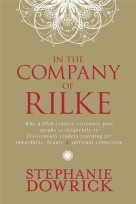You may know that it was the Austrian poet Rainer Maria Rilke who wrote the oft-quoted exhortation to “Live the questions now … [so that] you might live some day into the answer.”
You may not know that, on his birth, Rainer Maria’s mother, Phia, consecrated him to “the gracious Madonna” and gave him a little cross “so Jesus was his first present”.
Throughout his life, Rilke recoiled from his mother’s clutching and from what he perceived as her possessive, limiting and disfiguring religion.
And yet he yearned for God.
This makes Rilke a perfect poet for our times, claims author and interfaith minister, Stephanie Dowrick, in her comprehensive and stimulating book exploring the great poet’s life and work.
The logic behind her claim is this:
While many people are abandoning the God of “creeds and cathedrals” others still hunger for the “lived desired for the sacred”.
It is these people — the yearning reader — who will be drawn to Rilke’s poetry, again and again, because Rilke is “magnetised by God, even in God’s frequent absence” and his poetry seeks out and speaks of spiritual intimacy.
Rilke called God (among many other names), “You, the great homesickness we could never shake off.”
Rilke’s is not the familiar theistic God but something else, Dowrick says, “further out (and further in)”. Unfinished, vulnerable, sought and seeker, needed and needy; this is not the God of literalists, she explains.
As well as painting a very clear picture of Rilke as a complex, flawed man and masterful poet of the 20th century, this book argues for a return to reading poetry to plumb life’s hidden depths.
For instance, as antidote to the violence of functionalism, interactive marketing and modern life’s speed, take Rilke’s pause.
“The pause is everywhere in a Rilke poem,” Dowrick says. “In fact, it is possible to suggest that the very idea of seeking and reading a poem can be experienced as a willingness to pause, both quickening and deepening life.”
Reading life through Rilke’s poetic lens could help you live the questions now — a journey this book, and at least some Christian theologians, would encourage.
Add to your questions one of Dowrick’s: “What is a poem for if it is not potentially transformative?




Recent Comments